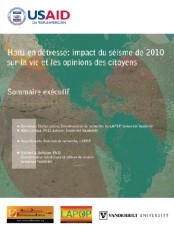|
||||||||||||||||||
| Download the revised decree and electoral calendar, published in the official journal |
|
|
Haiti - Social : Impact of January 12 on citizen lives and perceptions - Part II 29/05/2011 11:02:50
"Haiti in Distress: The Impact of the 2010 Earthquake on Citizen Lives and Perceptions" presents the results of a comprehensive face-to-face public opinion survey carried out in July and August of 2010, especially designed for evaluating the human impact on those who survived the devastating earthquake that struck Haiti on January 12th, 2010. The survey was conducted by the Latin American Public Opinion Project (LAPOP) at Vanderbilt University as part of the region-wide AmericasBarometer with financial support from the United States Agency for International Development (USAID). In this second part, basic services provision, the Life Satisfaction and access to basic services, how can standards of living be improved in Haiti and the findings of the study. Basic Services Provision Access to basic services such as water, electricity, food, health, and education is greatly limited in the country, with some populations clearly showing a more limited access of basic services than others. Staggering inequality in access to basic services is a central feature of Haiti's underdevelopment. For instance, we find that more than a half of the Haitian population (53.2%) reported not having direct access to electricity after the earthquake. But striking differences in access are found when the sample is divided between rural and urban areas and level of wealth. While in the rural areas 79.1% of those in the third tercile of household wealth have electricity in their homes, only 7.9% of individuals in the first tercile of wealth have access to this service. Similarly, regarding water services, only 40.1% of the population reported having access to running or piped-in water. But, in the rural areas only 12.6% of individuals in the first tercile of household wealth consume running or piped-in water, in comparison to 48.2% of those in the third tercile. Electricity - Only 48.8% of households have direct access to electricity in Haiti. - About 68% of households in the Metropolitan area and 26.7% in rural areas have access to electricity. - Inequality in access is greater in rural areas: only 7.9% of households in the first tercile of wealth have electricity in rural areas, in comparison to 79.1% of those in the third tercile. - More than half of households with access to electricity receive the service fewer than 7 hours per day. - In rural areas the level of satisfaction with the electricity service is by far the lowest with 27.5 points on a 0-100 scale. Water - Only 40.1% of families consume piped water in Haiti. - About 68% of households in the Metropolitan area and 22.9% in rural areas have access to piped water. - Inequality in access is greater in rural areas: only 12.6% of households in the first tercile of wealth use piped water in rural areas, in comparison to 48.2% of those in the third tercile. - Among those with access to piped water, only 47.2% of them reported receiving the service on daily basis. - Residents of rural areas reported the lowest average level of satisfaction with water services with 31.1points on a 0-100 scale. Health - About 37% of individuals reported to have personally (or someone else in their home) needed medical attention over the past year. - Of those who reported receiving medical attention, about 30 percent said they consulted a general practitioner, followed by a specialist (28.3%) or a nurse (25.7%). - Individuals living in the Metropolitan area show the highest level of satisfaction with health care facilities, with 70.2 points on a 0-100 scale. Residents in rural areas reported the lowest average level of satisfaction with the services at healthcare facilities (58.0 points). - About half of the population rated the primary health care system in the country as "neither good nor bad." Nutrition -About a third of the respondents reported that at least one adult member in the household had suffered from food deprivation for a whole day at least once in the 3 months prior to the survey. -Food insecurity is a significant problem in all areas in the country Education - About 65% of households in Haiti have children in schoolage (between 6 and 17 years old). - A school-age child living in an average household, with 2 school age children, has about 73% chance to attend school. - A school-age child living in a household with 4 schoolage children, has about 44% chance to attend school. - Respondents living in households with children studying in private institutions are significantly more satisfied with the quality of education than those with children in public schools, regardless of area of residence. - About 44% of the population rated the quality of the education system as "neither good nor bad." On the other hand, 36.2% reported a negative perception, considering education services as "bad" or "very bad." Life Satisfaction and Access to Basic Services As with many other indicators reported in the study, we find that Haiti ranks last compared to other countries in the region when citizens' level of life satisfaction is examined. On a 0-100 scale, the average level of life satisfaction in Haiti is only 35.4 points. Conversely, Brazil and Costa Rica, the countries with the highest averages scores 67.7 and 71.6 points, respectively. Moreover, the average level of life satisfaction in Haiti is far below the second lowest score in the region, which scores a little over 50 points. As depicted by the extent of life satisfaction, Haitians are by far the saddest citizens in the Western Hemisphere. Not having adequate electricity and water services are important contributors to the generalized life dissatisfaction in Haiti. Although the overall level of life satisfaction is low in the country, those who do not have access to electricity or piped-in water show even lower scores. How can standards of living be improved in Haiti? We find that, because of Haitians' low confidence in the performance of government, support for governmental action to improve the lives of the poor is remarkably low. Indeed, Haiti shows the lowest level of support for an active state in the reduction of poverty and inequality in the Latin American and Caribbean region, with 62.7 points on a 0-100 scale. The support for government intervention in the economy is strongly linked to citizens' perceptions about the performance of the president, and therefore the government. Individuals with negative perceptions about the president's performance show the lowest levels of support for public policies aimed at improving the living conditions of people in need. This finding has important implications for the design of development strategies for Haiti. The findings of the study suggest that, given citizens' low confidence in government, any development strategy put in place in Haiti will be more likely to succeed if it also entails an active participation of the private sector and non-governmental institutions along with efforts to strengthen the capacity of governmental institutions. Part I HL/ HaitiLibre
|
|
|
Why HaitiLibre ? |
Contact us |
Français
Copyright © 2010 - 2026 Haitilibre.com |





